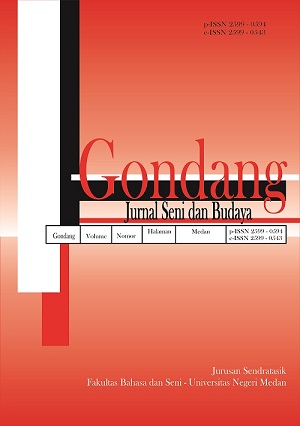Perspektif Hipersemiotika pada Pertunjukan Sori in the Land of Lembuna Karya Flying Balloons Puppet dan Gwen Knox
DOI:
https://doi.org/10.24114/gondang.v5i2.29567Keywords:
Hypersemiotic, Puppet Theatre, Recycled SignAbstract
Sori in the Land of Lembuna Performance by Flying Balloons Puppet and Gwen Knox presenting a discourse of river habitat polution phenomenon packed as explorative and imaginative. Analytical method done with hypersemiotic perspective which qualitative interpretative. The review on signs that were present in the performance is done with hypersemiotic perspective. Hypersemiotic perspective analysis used are content of recycled signs that were present in the performance. Lembuna is a character representing the myth of Lembudana and Lembudini, as a past reality, recontextualized into present reality in the form of a Plastic Monster as a representative of environmental pollution from plastic wastes piling up in the river ecosystem. The present of both merge into new reality in the form of a performance, so between signs and reality, even reality and non reality are hard to be distinguished.References
Andariati, Leni. (2019). Relevansi Mitos Kali Pemali dengan Etika Lingkungan islam. Jurnal SMaRT Studi Masyarakat, Religi, dan Tradisi. 05(02).
Barthes, Roland. (2011). Mitologi. Edisi Keempat. 1983. Terjemahan Nurhadi dan A. Sihabul Millah. Yogyakarta: Kreasi Wacana.
BBC. (2018). Seberapa besar ancaman bahaya plastik di danau dan sungai?. https://www.bbc.com/indonesia/vert-fut-44035755. Diakses pada 3 Januari 2019.
Danesi, Marcel. (2011). Pesan, tanda, dan Makna: Buku Teks Dasar Mengenal Semiotika dan Teori Komunikasi. Cetakan Kedua. 2004. Yogyakarta: Jalasutra.
Darmayasa, Made. (1993). Keagungan Sapi Menurut Weda. Denpasar: Pustaka Manikgeni.
Hindu Times. (2020). Asal - Usul Virus dalam Atharva-Veda. https://www.youtube.com/watch?v=XvFb9isKXlI&t=5s. Diakses pada 25 Februari 2020.
Pasraman Ganesha Brahmachari Ashram. (2015). Makna Simbolis Ular dalam Hindu. http://www.pasramanganesha.sch.id/2015/12/ makna-simbolis-ular-dalam-hindu.html. Diakses pada 14 Februari 2020.
Piliang, Yasraf Amir. (2003). Hipersemiotika: Tafsir Cultural Studies atas Matinya Makna. Yogyakarta: Jalasutra.
Piliang, Yasraf Amir. (2012). Semiotika dan Hipersemiotika: Kode, Gaya dan Matinya Makna. Bandung: Matahari.
Rohidi, Tjetjep Rohendi. (2011). Metode Penelitian Seni. Semarang: Cipta Prima Nusantara.
Sejarah Kabupaten Brebes. (2011). Brebes: Pemerintah Kabupaten Brebes.
Sejarah Mentalis Brebes. (2009). Brebes: Bappeda Kabupaten Brebes.
Unan-unan Masyarakat Tengger. (2018). Malang: Citra Bromo.
Downloads
Published
How to Cite
Issue
Section
License
Copyright (c) 2021 Gondang: Jurnal Seni dan Budaya

This work is licensed under a Creative Commons Attribution 4.0 International License.

This work is licensed under a Creative Commons Attribution-NonCommercial-ShareAlike 4.0 International License.

